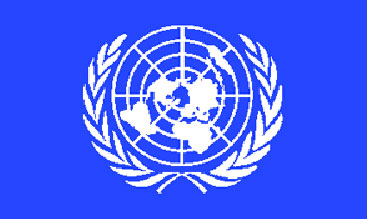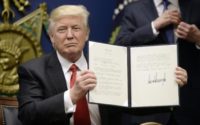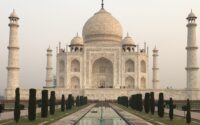
The United Nations (UN) is an international organization whose stated aims are to facilitate cooperation in international law, international security, economic development, social progress and human rights issues. The United Nations was founded in 1945 to replace the League of Nations, in the hope that it would intervene in conflicts between nations and thereby avoid war.
There are currently 192 United Nations member states, encompassing almost, but not every recognized independent state. From its headquarters in New York City, the UN and its specialized agencies decide on substantive and administrative issues in regular meetings held throughout each year. The organization is divided into administrative bodies, including the General Assembly, Security Council, Economic and Social Council, Secretariat, and the International Court of Justice (ICJ). Additional bodies deal with the governance of all other UN System agencies, such as the World Health Organization (WHO) and United Nations Children’s Fund (UNICEF). The UN’s most visible public figure is the Secretary-General. The current Secretary-General is Ban Ki-moon of South Korea, who assumed the post on January 1, 2007 replacing Kofi Annan of Ghana.
The organization began with fifty countries signing the United Nations Charter. The organization’s structure unfortunately still reflects in some ways the circumstances of its founding. The five permanent members of the UN Security Council, each of which has veto power on any Security Council resolution, are the main victors of World War II or their successor states: China, France, Russia (which replaced the Soviet Union in 1991), the United Kingdom, and the United States.
These members hold veto power over substantive but not procedural resolutions allowing a permanent member to block adoption but not debate of a resolution unacceptable to it. The ten temporary seats are held for two-year terms with member states voted in by the UN General Assembly on a regional basis. The presidency of the Security Council is rotated alphabetically each month.
The Security council has been rightfully criticized for being unable to act in a clear and decisive way when confronted with a crisis. The veto power of the five permanent members has been cited as the cause of this problem. Under the “Uniting for Peace” resolution, adopted by the General Assembly in November 1950, the assembly may take action if the Security Council, because of lack of unanimity of its permanent members, fails to act where there appears to be a threat to international peace, breach of the peace, or act of aggression. The makeup of the security council dates back to the end of World War II, and this division of powers no longer represents the state of the world. Critics like myself question the effectiveness and relevance of the Security Council because enforcement relies on the member nations and there usually are no consequences for violating a Security Council resolution. It leaves for absolute power to the permanent members with no downside penalties if a permanent member acts selfishly or not in the best interest of a specific issues resolution.
This is an unfair system and really causes strife and disdain throughout much of the rest of the world. Obviously, there are many more regions of the world than are simply represented in the 5 permanent members. A country like Brazil could and should represent Latin America while a country like Japan, Australia, or India should be able to represent their free nations as an Asian/Pacific representative instead of giving China and Russia all power in the region. This system is very flawed and has proven to be dangerous.
In many cases UN members have shown reluctance to achieve or enforce Security Council resolutions. Iraq is said to have broken 17 Security Council resolutions dating back to June 28, 1991 as well as trying to bypass the UN economic sanctions. For nearly a decade, Israel delayed implementing resolutions calling for the dismantling of Jewish communities in “occupied territories”. Such failures stem from the UN’s intergovernmental nature — in many respects it is an association of 192 member states who must reach consensus, not an independent organization. Even when actions are mandated by the 15-member Security Council including the five permanent members, the Secretariat is rarely given the full resources needed to carry out the mandates.
Other serious failures which led to countless, unbearable loss of life include: Failure to prevent the 1994 Rwandan genocide, which resulted in the killings of nearly a million people, due to the refusal of Kofi Annan and security council members to approve any military action; Failure by MONUC to effectively intervene during the Second Congo War, which claimed nearly five million people in the Democratic Republic of Congo (DRC), 1998-2002, and in carrying out and distributing humanitarian aid; Failure to intervene in the 1995 Srebrenica massacre: despite the fact that the UN designated Srebrenica a “safe haven” for refugees and assigned 600 Dutch peacekeepers to protect it, the peacekeeping force was not authorised to use force; Failure to successfully deliver food to starving people in Somalia; the food was instead usually seized by local warlords. A U.S./UN attempt to apprehend the warlords seizing these shipments resulted in the 1993 Battle of Mogadishu recreated in the excellent US film ‘Blackhawk Down’; Failure to implement the provisions of UN Security Council Resolutions calling for disarmament of Lebanese paramilitary groups such as Fatah and Hezbollah which resulted in countless deaths; UN ambulance caught on tape transporting armed Palestinians forces in 1994; Allegations of sexual abuse by UN peacekeepers during UN peacekeeping missions in Congo, Haiti, Liberia, and Sudan.
These failures are unimagineable and unforgettable. The concept of change is so simple but these permanent members including my country refuse to cede their unconditional veto power. Not that the five permanent members are the only problem within the UN but the UN needs to act on this and make it more fair and give less power to the five biggest arms dealers in the world, while also using force if necessary to stave off an oncoming conflict. Perhaps if changes do occur at the United Nations, many people wouldn’t feel that the entire organization doesn’t really accomplish anything when it comes to conflicts around the world and question its mere existance as more than an Amnesty International type organization.












Lee, fantastic points and very well laid out argument. I couldn\’t agree more on most of your points. The UN needs to realize the nature of the world today and that sometimes just the authorization of lethal force from its peacekeeperes can subdue violence in an area. If the rebels in these places know they are at no real risk then they have the advantage. Also, they are putting their peacekeeperes at risk as well by not letting them defend themselves properly
Wow, I didn’t realize all that stuff happened because of the UN dragging their feet or whatever you want to call it. Thank you for bringing that to light for me.
Wow, thats deep stuff. Great post.